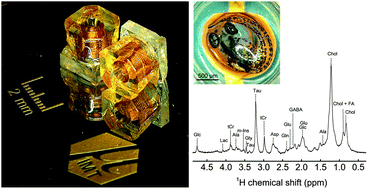Inductively coupled magic angle spinning microresonators benchmarked for high-resolution single embryo metabolomic profiling†
Abstract
The magic angle coil spinning (MACS) technique has been introduced as a very promising extension for solid state NMR detection, demonstrating sensitivity enhancements by a factor of 14 from the very first time it has been reported. The main beneficiary of this technique is the scientific community dealing with mass- and volume-limited, rare, or expensive samples. However, more than a decade after the first report on MACS, there is a very limited number of groups who have continued to develop the technique, let alone it being widely adopted by practitioners. This might be due to several drawbacks associated with the MACS technology until now, including spectral linewidth, heating due to eddy currents, and imprecise manufacturing. Here, we report a device overcoming all these remaining issues, therefore achieving: (1) spectral resolution of approx 0.01 ppm and normalized limit of detection of approx. 13 nmol s0.5 calculated using the anomeric proton of sucrose at 3 kHz MAS frequency; (2) limited temperature increase inside the MACS insert of only 5 °C at 5 kHz MAS frequency in an 11.74 T magnetic field, rendering MACS suitable to study live biological samples. The wafer-scale fabrication process yields MACS inserts with reproducible properties, readily available to be used on a large scale in bio-chemistry labs. To illustrate the potential of these devices for metabolomic studies, we further report on: (3) ultra-fine 1H–1H and 13C–13C J-couplings resolved within 10 min for a 340 mM uniformly 13C-labeled glucose sample; and (4) single zebrafish embryo measurements through 1H–1H COSY within 4.5 h, opening the gate for the single embryo NMR studies.



 Please wait while we load your content...
Please wait while we load your content...